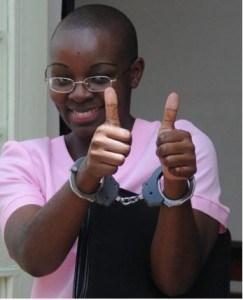
Victoire Ingabire, leader of FDU-nkingi, coming out of a Rwandan court with handcuffs.
At the occasion of the third anniversary of Victoire Ingabire Umuhoza returning back home to Rwanda, it is important to look briefly at the journey that democracy has encountered as a political path for a true development of the country.
It was on January 16th, 2010 that the leader of FDU-Inkingi landed in Kigali after an exile of sixteen years in The Netherlands.
One of her political acts on the first day in Rwanda was to visit the Genocide Memorial at Gisozi. The short announcement she made at the intention of the press would constitute her initial sin in the face of the RPF regime. Maybe to measure and understand how Paul Kagame is opposed to differing ideas from his own, a reading of Ingabire’s statement to journalists at the time is necessary.
Her speech, translated in English below, was later on submitted as evidence in in court on divisionism and revisionism charges levelled against her.
“I would like to say that today, I came back to my country after 16 years, and there was a tragedy that took place in this country. We know very well that there was a genocide, extermination. Therefore, I could not have returned after 16 years to the same country after such actions took place. They took place when I was not in the country. I could not have fallen asleep without first passing by the place where those actions took place. I had to see the place. I had to visit the place.
“The flowers I brought with me are a sign of remembrance from the members of my party FDU and its executive committee. They gave me a message to pass by here and tell Rwandans that what we wish for is for us to work together, to make sure that such a tragedy will never take place again. That is one of the reasons why the FDU Party made a decision to return to the country peacefully, without resorting to violence. Some think that the solution to Rwanda’s problems is to resort to armed struggle. We do not believe that shedding blood resolves problems. When you shed blood, the blood comes back to haunt you.
“Therefore, we in FDU wish that all we Rwandans can work together, join our different ideas so that the tragedy that befell our nation will never happen again. It is clear that the path of reconciliation has a long way to go. It has a long way to go because if you look at the number of people who died in this country, it is not something that you can get over quickly. But then again, if you look around you realize that there is no real political policy to help Rwandans achieve reconciliation. For example, if we look at this memorial, it only stops at people who died during the Tutsi genocide. It does not look at the other side – at the Hutus who died during the genocide. Hutus who lost their people are also sad and they think about their lost ones and wonder, ‘When will our dead ones be remembered?’
“For us to reach reconciliation, we need to empathize with everyone’s sadness. It is necessary that for the Tutsis who were killed, those Hutus who killed them understand that they need to be punished for it. It is also necessary that for the Hutus who were killed, those people who killed them understand that they need to be punished for it too. Furthermore, it is important that all of us, Rwandans from different ethnic groups, understand that we need to unite, respect each other and build our country in peace.
“What brought us back to the country is for us to start that path of reconciliation together and find a way to stop injustices so that all of us Rwandans can live together with basic freedoms in our country.”
Understandably, Rwandan laws that saw in this speech the basis of Victoire Ingabire’s imprisonment on October 14th, 2010 must have a particularly distorted reading of people’s expression.
She was also alleged to have formed a rebel group to oust Kagame’s regime and many other fabricated charges before being sentenced to eight years of jail last year.
Claude Gasebuke, a Rwandan genocide survivor and human rights advocate, explains in the video that one can watch by clicking here, that
“…she is also a threat to the Kagame regime in that if there were ever a free and fair election in the country of Rwanda, and Victoire Ingabire ran against Paul Kagame, she will win against him.”
In the August 9th, 2010 general elections, Paul Kagame almost ran against himself without any other viable candidate and won 93 percent of the votes. He had eliminated his real political opponents in one way or another.
That made the White House to make the following statement
“… We remain concerned about a series of disturbing events prior to the elections. Democracy is more about holding elections.”
Among the events that marred that election year had been the assassinations of Andre Kagwa Rwisereka, Vice-Chairman of the Democratic Green Party, and Journalist Jean-Louis Rugambage, arrests of Deo Mushayidi, Chairperson of PDP-Imanzi, Bernard Ntaganda, Chairperson of PS-Imberakuri, and many other supporters of political parties of the opposition.
After three years of Victoire Ingabire returning home, prior injustices have remained, though being applied in a completely changed Rwandan political landscape.
The Rwandan president Paul Kagame has lost his past credentials of a visionary leader that many of his western friends likened to characterize him with.
Democracy has still a difficult journey to do in Rwanda. But it is primarily up to the citizens of that country to put in the hard work and necessary required energy to finish it.
